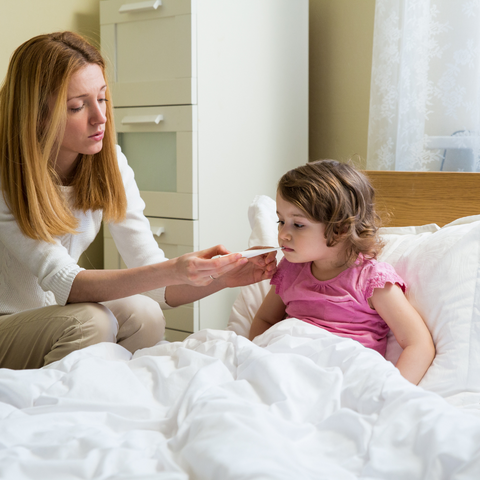
Does Chickenpox Cause a Fever?
Disclaimer: The information in this article is for educational purposes only and is not a substitute for professional medical advice.
Always consult with a qualified healthcare provider for any questions regarding a child's case of chickenpox or any other medical condition.
The author and publisher are not liable for any negative consequences resulting from following the information provided in this article.
Chickenpox is a common viral infection that most people have experienced or at least heard about.
It is well known for causing a red, itchy rash, but what about other symptoms, such as fever? 
In this article, we will explore the relationship between chickenpox and fever, providing useful insights for managing and preventing the illness.
What is Chickenpox?
Chickenpox is a contagious infection caused by the varicella-zoster virus. It is most common among children, but anyone who has not had the infection or been vaccinated can contract it.
Symptoms
Some common symptoms of chickenpox include:
- A red, itchy rash that develops into fluid-filled blisters.
- Fatigue.
- Loss of appetite.
- Headache.
Causes
The varicella-zoster virus is responsible for causing chickenpox. It is transmitted from person to person through direct contact with the rash, inhalation of airborne particles from an infected person's cough or sneeze, or by touching contaminated surfaces.
Transmission
Chickenpox is highly contagious, and a person can be infectious for up to two days before the appearance of the rash until all the blisters have crusted over.
What is a Fever?
A fever is a temporary increase in body temperature, usually caused by an infection or illness.
Causes of Fever
Fever can result from a variety of factors, such as:
- Bacterial infections.
- Viral infections.
- Heatstroke.
- Inflammatory conditions.
Fever as a Symptom
A fever often accompanies other symptoms and can be a sign that your body is fighting off an infection or other health condition.
Does Chickenpox Cause a Fever?
Fever in Chickenpox Patients
Yes, chickenpox can cause a fever. In fact, fever is one of the common symptoms of chickenpox and usually appears within the first few days of the illness. The fever typically ranges from 100°F to 102°F (37.8°C to 38.9°C) and can last for several days.
Why Chickenpox Causes Fever
The fever associated with chickenpox is a result of the body's immune response to the varicella-zoster virus. As the immune system fights off the virus, it releases chemicals called cytokines, which increase body temperature and cause fever.
Managing Chickenpox and Fever
Home Remedies
Some home remedies for chickenpox and fever include:
- Rest and hydration
- Cool baths or compresses to soothe the skin and reduce fever.
- Calamine lotion or other over-the-counter remedies for itching.
- Non-aspirin pain relievers like acetaminophen for fever and discomfort (Note: Do not give aspirin to children with chickenpox, as it can lead to a severe condition called Reye's syndrome).
Medications
In some cases, antiviral medications may be prescribed by a doctor to help manage chickenpox, particularly for those at risk of complications. However, these medications are most effective if taken within the first 24 hours of the appearance of the rash.
When to Seek Medical Help
You should consult a healthcare professional if:
- The fever lasts longer than four days or exceeds 102°F (38.9°C)
- The rash becomes infected, warm, or increasingly painful
- The person with chickenpox is at risk of complications due to a weakened immune system or other health conditions
Preventing Chickenpox
Vaccination
Vaccination is the best way to prevent chickenpox. The chickenpox vaccine is recommended for children, adolescents, and adults who have not had the infection or have been vaccinated.
Infection Control
If you or a family member has chickenpox, practice infection control measures, such as:
- Keeping the infected person away from others, particularly those who are not immune
- Washing hands frequently
- Disinfecting surfaces and objects that may be contaminated
In Summary
Chickenpox can cause a fever as the body's immune response to the varicella-zoster virus. By managing symptoms and taking preventative measures, such as vaccination and infection control, you can help reduce the risk of complications and keep yourself and your loved ones healthy.
FAQs
Can adults get chickenpox?
Adults can get chickenpox if they have not had the infection or been vaccinated. Adults are at a higher risk of complications compared to children.
Can you get chickenpox more than once?
It is rare but possible to get chickenpox more than once. After recovering from chickenpox, the immune system typically provides long-term protection against the virus.
How long does chickenpox last?
Chickenpox generally lasts for 5-10 days. The rash appears in stages and typically takes about one week to go through the full cycle of development, from red bumps to fluid-filled blisters to scabs.
Are there any long-term effects of chickenpox?
In most cases, chickenpox does not have long-term effects. However, the varicella-zoster virus can remain dormant in the body and reactivate later in life, causing a condition called shingles.
Can I spread chickenpox even if I don't have symptoms?
Yes, a person can be contagious for up to two days before the appearance of the rash, which means they can spread chickenpox even if they do not have visible symptoms.
